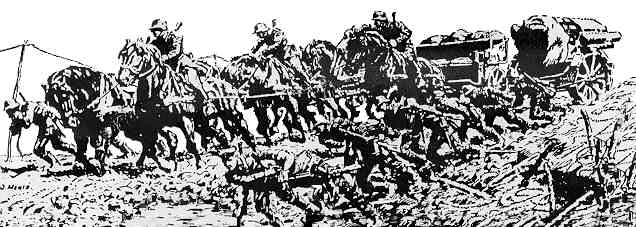
Battery
Corporal
Willis S. Cole
Military Museum
The Largest Museum Display Item Is A German 1917 Krupp 210mm Lange
Morser (Howitzer)
The only one in the world where everything moves as it did during World War One
www.ww1.org
A Non-Profit Corporation
ww1@ww1.org
13007 W 12th Ave, Airway Heights, WA 99001-9464 ww1@ww1.org (509)723-6059 U.S.A.
To insure our homepage loads as fast as possible, we have moved many inter-active picture buttons to grouped Battery Corporal Willis S. Cole
Military Museum is named after Willis
Samuel Cole, who served as
a Corporal in the 295th Military Police Company, 6th Division, in France during Word War One.
The
museum's main focus is on
World War One, with World War Two American aviation in Europe
becoming
a larger area of research.
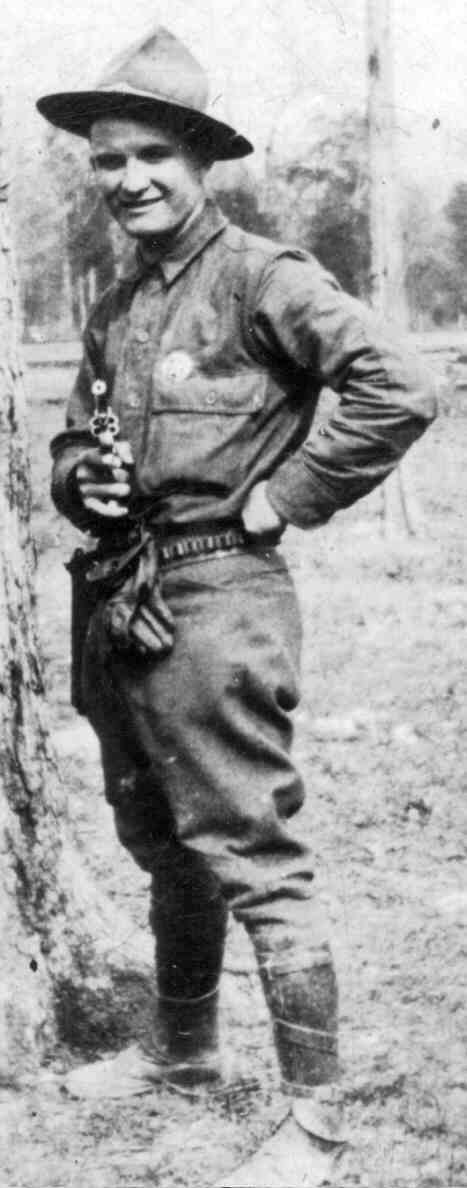
Willis S. Cole
His Story
(Click On The
Photograph And Go!)
The museum displays relics of World
War One, featuring both battlefield recovered relics and
souvenir quality relics. Its major display is a
18,000 pound, 210 mm, 21 cm, (8.274 inch) German
Lange
Mortser, one of only 21 left of the 474 built by Germany
from 1911 through December, 1917.
One four foot section of British tank track in our collection
has been traced to one of the first
50 tanks used in warfare. The tank track was shot off by a German
artillery piece that was located
a few kilometers away. That same artillery piece was destroyed the same
day by the French, who
came over a ridge to the southeast of the German location. They saw the German
artillery and
pulled by hand, a French 75mm cannon into position. Its first shot,
destroyed the German cannon,
which can now be seen at the Albert Military Museum, which is located in the
French air raid
shelters from World War Two.
Among our growing displays are
recovered relics of the dual
Congressional Medals Of Honor
bomber, the B-17G-35VE,
Serial Number: 42-97904, named the Lady
Jeannette.
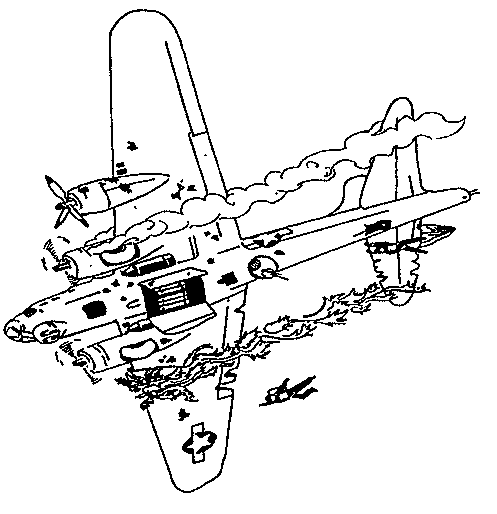
The Lady Jeannette, just as the last
survivor bails out.
Notice the Tail Gunner trapped and hanging under the tail.
On the various pages of the site, you will
learn about our research into the identity of the
American Remains contained in the grave of an Unknown
American Aviator of World War Two,
as well the fate of entire crews of the five bombers that became
linked together during our research.
This particular research all started when on
Christmas Eve, 1991, when the museum's Director
was introduced to the grave located in the village cemetery of Cartigny,
Department of the Somme,
France, located a few km east-south-east of Peronne, of World War One fame.
The grave is no longer unidentified, as a new
20" X 36" grave marker was dedicated on the
10th of November, 2000, 56 years to the day of the death of the three men whose
partial remains
are buried in the grave.
The grave marker provides the names and all the information required to verify
our research into
the identity of the three B-24J crewmen
whose partial remains are buried
in this common grave. The
result of the only fully witnessed
and documented case of American
Soldiers of World War Two
recovering the remains of dead
American Aviators and later hiding
most of the remains they recovered
along a French road.
The origin of the Grave at Cartigny, can now be fully
explained. Nine years and eleven months
after the beginning of the quest that Christmas Eve, the only living survivor of
the three men from
the
hospital unit attached to the 397th Bombardment group was found by pure luck.
The man I
finally located, PFC Barney Silva, had been an ambulance driver and he drove one
of the hospital's
Doctors and an Enlisted Medical Sgt. to the crash site.
From his testimony, we now know, that the remains of the three men in their
"Official Graves"
were recovered
by these three men, after their arrival at the crash site at 3:30 a.m. in
the early
morning of
10 November, 1944, about one hour after the crash. They left the crash
site at 06:30
to take the three newly created "Official Burial Packages" to
their main, reporting hospital at St-Quentin
The remains recovered in those hours before full light
became the "Official Remains" accounted
for by Capt. Judson, the Doctor, which were buried in the men's "Official
Graves." However, they had
recovered only the larger remains of the three men killed, which totaled about
the weight on one man,
120/150 pounds and they left the crash site, leaving the rest
of the men's remains
unaccounted for.
When full daylight finally came that late, cloudy fall day,
the people around the crash site began to
find more and more pieces of men. In mid-morning, another ambulance believed to
be from the
hospital
located in Peronne, came to the crash site. This is the ambulance crew that
the French
helped recover
the "bits and pieces of human, about what one see when one prepares sausage"
is
the most heard quote
from those that helped these men recover the rest of the crew's remains
at the
crash site.
As no one in this crew has been found, one has to believe
they found out that the Air Base Hospital
had already turned over remains to a hospital at St-Quentin about 15 miles to
the east. By regulation,
they should have taken men's remains to
that hospital. However, they did
not. What they did do,
was to stop by the road and bury the remains they
had just recovered with the
help of the French
people. What they did not know, was that they were
observed by one of the French who had just
helped them recover what they were illegally hiding.
So, now we know and can prove with an American participate,
that the Village Priest who recovered
the second set of remains hidden by the Americans was correct in his statement
at the time. And, that
the French who believe the remains in the grave was all the remains recovered
are also correct. For
the grave does contain the vast majority of the remains of the three American
Aviator killed in the crash
of their B-24J, SN: 42-51226, 36th BS (RCM) about 2:30 a.m., 10 November, 1944.
The museum's most recent research has lead
to a totally different and newly understood end of
the last flight of the dual
Congressional Medals Of Honor bomber; the Lady
Jeannette, and the
relationship of the medal citations with the
last flight of a "Top Secret" B-24J bomber of the 36th
Bomb Squadron (RCM - Radar Counter Measures) on a "spoofing mission" against Germany
FLAK and Night Fighter Radars, while on a night mission with the 100th Group Royal
Air Force
protecting R.A.F.
and R.C.A.F. flying night bombing missions against German targets.
The research is also tied together with a
crashed B-26 bomber, "Where's It At?". The Pilot
and Co-Pilot of that
bomber were both awarded the Solders
Medal, the highest
non-combat medal.
The Official Records of the 9th USAAF, state their mission that day, lead to the
most successful
day of the entire war for the 9th USAAF. Equal mention of that day's
mission, 22 January, 1944,
against the "Our River Bridge" can be found in many military histories.
Two other bomber
crashes of World War Two, one a Royal Canadian Air Force Halifax and the
othe,r a
B-17G bomber
are tied together and intertwined with the museum's original research.
These
two crashes lead to
the execution of the evading American Pilot and the Canadian Radio Operator at
the hands of the Germans, in the woods above Olizy-Primate, Department of the Ardennes,
on
August 8, 1944.
Aviateur Americain
INCONNU
MORT POUR FRANCE - en 1943
Stories of the five bombers, lost in action over Europe.
and the grave of three men K.I.A. that was marked
UNKNOWN for fifty years.
(Click on the picture and go!)
The museum is a very active participant in
preserving the military history of the United States
and its Allies during both wars. If you believe,
that this history deserves to become memorialized
where the events and memorials occurred, you can help in
the meeting the museum's goals with a
specifically allocated tax-deductible donation to the museum that will
be used to defray expenses
of memorization.
The museum's research specialty is 'site
specific' research, in Europe, mainly along the Battle
Lines of World War One and World War Two's aircraft crash sites. The
museum's volunteer staff
searches for information from diaries, books, and visitor input to seek the
exact location where
notable events of World War One and Two took place. These sites are
then intensely researched
in Europe, including interviews with local people for legends of
the event and if possible, locate
actual eyewitnesses to learn and record their stories.
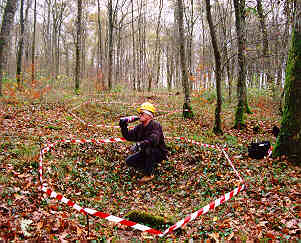
Willis S.
Cole, Jr. "Sam" at the crash site of
the Lady Jeannette. Proof still impressed in
the earth's surface that the bomber did not
crash as specified in the Medal Citations.
During second survey visit to crash site.
After 56 years, the missing
Identity Tag of
1st Lt. Donald J. Gott, Congressional
Medal Of Honor
was recovered at the crash site
in May, 2000.
After 56 years, evidence of human remains were
also found
at dual Congressional Medal Of Honor
crash site in
France.
As of 31 December, 2005, CIL, now called JPAC, Hawaii,
has failed to conduct a full on-site
Search and Recovery
for crew remains.
As of 31 December, 2005, JPAC has failed to notify the
researcher who had the Legal Right To Know,
of any
determination concerning the bone fragment turned
over to Mortuary Affairs in Germany, 26 May, 2000.
As of 31 December, 2005, J.P.A.C. has failed
to account for,
or return 1st Lt. Gott's Identity Tag found
at the crash
site, and by US law it was the property of the researcher
at the time it was requested and then
failed to be returned
as promised.
In late spring, 2006, the Gott
family members in Oklahoma,
were contacted by J.P.A.C. and informed,
the remains
had been proven to belong to 1st Lt. Gott. They did not
inform any of the survivors, the
families of the other
men, whose remains it could have been, or the museum
that an additional burial
as planned.
As of 6 June, 2006, J.P.A.C., the U.S. Military or anyone
else has failed to notify any of the other families
or the
museum of their actions concerning the remains turned
over to them, in May, 2000!
In November, 2001, the Village Elders of the Village
of Hattonville, Department of the Meuse, France,
agreed
that
the crash site and the original impact craters that are
still viewable, will be turned into a
Memorial Park
to the Lady Jeannette
and its crew.
On May 6th, 2002, the Museum
Director and the
villagers started to create the planned Memorial Park.
As of the end of September, 2002, the
Memorial Park
is
surrounded by a perimeter fence and each
of the impact
craters has been preserved and out-lined with a low single
chain fence.
During the week of December 7,
2003, during a visit to
the USAF Historical Research Agency archives
at Maxwell AFB, the identity of the
American unit stationed at Hattonville on the date of the
crash was
found. The 563rd SAW Battalion was a Signals
Air Warning unit for aircraft identification and control.
It
was attached to the XIX TAC, or 19th Tactical Air Command
providing air support to Patton's Third Army.
On January 5th, 2004, over 100
letters were sent to members
of the Battalion listed on a reunion list,
in the hope that
one of them will have the much sought eyewitness report
of an American that was at the
rash site.
On January
25th, 2004, after contacting ten people who
were Officers in the Command Structure in
the 563rd
SAW BN, or in the Medical Section, all of whom said almost
exactly the same thing, "I have
no memory of a B-17,"
we have located and verified a member of the HQ Company
of the 563rd, who
tells us, he was standing with a group
of men from the company, when they heard a rumble in
the distance
and a B-17 with fire and smoke coming from
it, flying a circle, flew over the village and crashed in the
distance. Describing exactly what many French and
other Americans in the area have already described.
But he is the first of his company to admit that
he saw
the bomber the day it crashed.
We are now hoping that some of
those contacted in
the past, will search their memories to see if they can
now remember what another remembers vividly.
As of 30 July, 2008, The men of the
563rd, that can
be placed at the crash site, standing
next to three bodies,
continue to declare the bomber
never crashed?
In April, 2006, the museum received an aerial
photograph of the crash site taken on 24 July, 1945.
In the picture, the swath cut into the woods is very
distinct and the broken tail and wing can be seen.
Obviously, the who have told a sister of the Co-Pilot
and the last survivor to bail out, that no bomber
crashed, are not telling the truth. Efforts continue
to obtain the truth from these men, as to where those
three bodies are no located, as the Official Burial Records
of the men, prove that there is no duplication of any
human bone in all four graves, combined!
July 30, 2008, the members of the 563rd SAW Bn., who
have now been
located at the crash site by eyewitness
testimony,
still claim
to have no knowledge of the B-17 crash at all.
Continuing
to insist the B-17 did not crash
when and where it did!
Addition trips have been made to
the Memorial Park and
the museum is working with the Villagers to insure that
this extremely unique World War Two crash site will beable to be visited for years to come.
The Memorial Park can be visited,
however the direct
access road has, again been delayed and it may be another
year before
the easiest access
road will be available.
Until that time, visitors need to stop
at the furniture
manufacturing shop, or home located next to the Memorial
in Hattonville for instructions on how to reach
the
Memorial Park. The owner is Mr. Robert LECLERC
and he and his family maintain the Memorial.
The shop is closed on Mondays, so
try at the home.
Be
prepared to spend
some time looking at the excellent
hand
made furniture. The best time is Tuesday through
Saturday.
The museum director
has become known for his
assistance in planning trips to visit the
World War One
lines of France and Belgium, tailoring each trip to fit your interests and
time.
People who are also
interested
in WWII battle sites will find they can easily mix both wars
together
during one tour.
Site Specific Research
And Tour Planning Assistance.
Cimetiere Militaire
National de Notre Dame de Lorette (P.d.C)
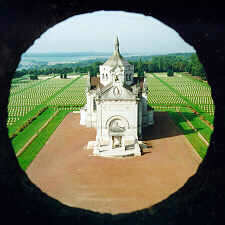
Research & Touring
(Click on the photograph and go!)
The real story of the crashes of the
crash
of the "Lady Jeannette" and the
crash of the Top-Secret B-24,
"226" which
resulted within hours, in the
implementation
of
Museum Store
(Click on the above book front page and go!)
One-of-a-kind, the only two known identifiable parts of
the
'Secret' B-24J, SN: 42-51226, crashed about 2:30 am
early in the morning of 10 November, 1944, at
Tincourt-Boucly, France.
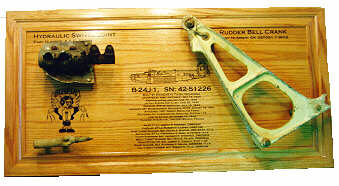
Museum Store
(Click on the photograph and go!)
Certified Authentic!
the "Lady Jeannette"
Pieces and parts of the
actual bomber, that 1st
Lt. Donald J. Gott, Pilot, and
2nd Lt. William E. Metzger, Jr.,
Co-Pilot, were aboard on 9 November, 1944, when
their actions were later awarded with Dual
Congressional Medals Of Honor.
Both
men died aboard the bomber that day, as well as the Radio Operator, T/Sgt.
Robert A.
Dunlap, and
Sgt.
Herman B. Krimminger, the Tail Gunner.
All parts and pieces are certified
to have been recovered by the museum's staff at the
crash site of the Lady Jeannette
during the staff's on-site research
visits in
France. To
date, over 600 hours have been spent at the crash
site, clearing the forest
floor,
establishing the crashing bomber's debris trail, the breakup of the
bomber as it
crashed through the forest and the final positioning of
the bomber's parts and pieces at
the crash site.
These relics are fully certified by the museum as to
authenticity,
location at the crash
site and identification process.
book store .
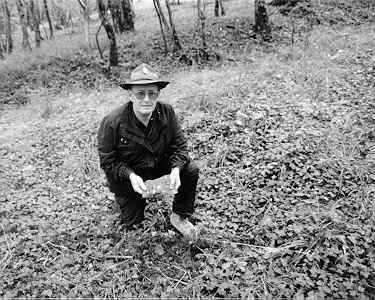
Battery Corporal Willis S. Cole Military Museum
Executive Director/Curator with cowl flap found
during a search of the forest floor to determine the
crash path of the 'Lady Jeannette, B-17G-35VE
Serial Number: 42-97904, crashed 9 November, 1944
Congressional
Medals Of Honor Relics
(Click on the picture and go!)
The museum's staff works with people
seeking information about the service of family
members
during World War One and World War Two. Special help is available for
family
research about family members discover what
happened to loved
ones who were either MIA
or KIA and not return from World War One and World War Two. The museum
continues
to have more and more people contact us for this help and there is never a
charge for such
help.
For our help, please visit our Missing In Action
and Killed In Action websites
listed below.

Request Research Assistance.
(Click the picture and go!)
Battery Corporal Willis S. Cole Military is supported by
donations and book sales. There is
no paid staff
and all tax deductible donations and Frequent Flyer Mile donations are used to
support the organization
goals, such as placing memorials at researched sites in Europe, and
for the volunteer staff to
travel when possible to conduct further research. The museum
welcomes tax deductible donations
of personal military memorabilia, which will be used for
display only.
The four Memorials have been have been dedicated.
In June, 2002, the Village Elders of
Tincourt-Boucly, France, removed
the large memorial. However, the Plaques were saved by Mr. Claude
OBERT, who is working to have a new memorial installed nearby both
crash site. As of June, 2006, this project is still in the working state.
span>
granite plaques and two memorials that consist of four plaques of the same
size. These four
plaques are mounted two wide and two high, with the four plaques making up
one master
memorial for each location, with a memorial surface 72 inches wide by 40 inches
high on a larger
concrete base.
One individual 20" x 36" memorial plaque, memorializes the
three men of the
B-24 buried at
Cartigny, France. Another memorializes the place, Olizy, France, where
Lt. Noble
and
P.O. DUBE were held for some time before their execution.
One set of four, memorializes the crash site of the
B-24, the B-26, the service of the 27th and
30th Divisions during World War One and the presence of the entire 452nd
Bombardment Group (H)
over France during World War Two.
The fourth memorial, at Hattonville, consists of a four plaque
memorial, memorializing the
Lady Jeannette, its crew
and their last flight which ended in France on 9 November, 1944. This
memorial also refers to the 109th Evacuation Hospital at which four of the
survivors were
treated and also, it also refers to the entire 452nd. Bombardment Group's service
in Europe during
World War Two.
The original plaque at Tincourt-Boucly, dedicated on the 9th of November, 1994.

The plaque shown above is just one of the things your donations have helped the museum
Cheyenne Tail-Turret metal
from B-17G-35 VE
'Lady Jeannette'
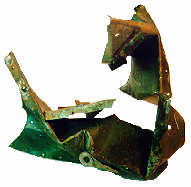
Recommended Sites To Visit!
Missing In Action, sponsored by the museum, aid to
research.
www.miakia.org
Killed In Action, sponsored by the museum, aid to research.
www.kiamia.org
Avril Williams Guest House, Auchonvillers, Somme, France
www.avrilwilliams.com
Fort Seclin Museum, a real French artillery museum in a real Fort, at Seclin, France
Located just south of Lille, France
www.fortseclin.com
Recommended reading: B-24 Pilot and Bombardier Stories
www.angelfire/fl/Ripcord/index.html
KilRoy was Here -
World War II and Korean War Secrets
www.kilroywashere.org/
Royal Air Force Bomber Command: 1939-45 Order of Battle
www.members.aol.com/rossmen/home.html
The Great War Society, World War One Historical Society.
www.mcs.net/~mikei/tgws/
World War 2 Photo-Gallery/D-Day Maps
www.beachin.net/ww2dday
Battle Of Arnhem Monument
www.surf.to/arnhem1944
Squadron Of Deception - The 36th Bomb Squadron (RCM) in World War II
Home of the B-24J- That crashed at Tincourt-Boucly.
www.36rcm.com
Excellent WWII Civilian Story With Sound
www.macksites.com/PART1.htm
World War One Informational Site - Excellent Visit
www.firstworldwar.com
World War One - 1914-1918 Netherlands Based Information Site -
Excellent Visit
www.worldwar1.nl
If you have a military history web site you would like to
become a recommended
web site, please submit it to ww1@ww1.org, we will visit your recommended web
site and if it fits into the museums military history goals, we will add it
above.
Older browsers and computers may not support
interactive pictures, please check
below to navigate if you are having problems. If you still cannot find the
information
you wish, please email us at ww1@ww1.org and we will see that you receive it.
Most of our communication failures seem to be with name@aol.com
email addresses.
If we do not answer your email within a reasonable time, it is probably because
our
email replies are being returned! Your interest is vital to us, don't give
up, if necessary
you can always use snail mail to the museum's
address at the top of this page.
We will answer!
If you browser does not support applets, try the
following to reach our site pages.
Museum Information Page And Newsletter:
www.ww1.org/museum1.htm
Tour Planning and Joining Tours:
www.ww1.org/tours.htm
Congressional Medal OF Honor Relics:
www.ww1.org/relics1.htm
More About The Book And Ordering:
www.ww1.org/bookpage1.htm
Research Assistance By Our Staff:
www.ww1.org/research_assistance.htm
Tax Deductible Donations To Museum, Funds, such as Frequent Flyer Miles
please email the Executive Director/Curator at:
ww1@ww1.org
+++++++++++++++++++++++++++++++++++++++++++++++++++++++++++++++++++++++++++++++++
The origin of this site was made possible by a
generous donation from
Donald Max
Compton
This site last updated: Saturday, August 01, 2009 17:20
Webmaster: ww1@ww1.org